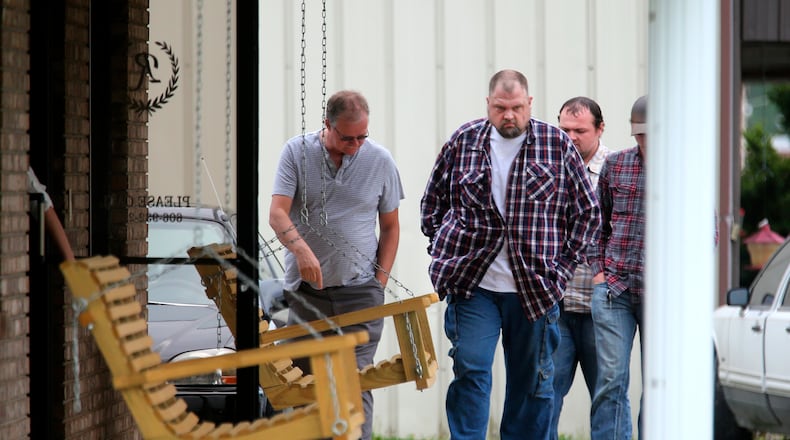Found dead that day were 40-year-old Christopher Rhoden Sr., 37-year-old Dana Rhoden, 20-year-old Hannah “Hazel” Gilley, 16-year-old Christopher Rhoden Jr., 20-year-old Clarence “Frankie” Rhoden, 37-year-old Gary Rhoden, 19-year-old Hanna May Rhoden, and 44-year-old Kenneth Rhoden.
The trial is the first time a person has faced a jury for the deaths of the Rhoden family six years ago.
BCI agent John Jenkins took the stand at the start of Wednesday morning to testify to recordings made of the Wagner family during the course of the investigation.
First, prosecutors played agents’ first interview with Billy Wagner, made six months after the murders.
BCI agents became aware of Billy after a few tips from members of the community mentioned him; Jenkins said they also decided, since Billy was the grandfather of Sophia, Hanna May’s child with Jake Wagner.
WATCH THE TRIAL LIVE | FEED PROVIDED BY WCPO
Jenkins said it took agents more time than normal to sift through all the people who had relationships with the Rhoden family, because of the high number of victims. Once they became aware of the Wagners, efforts to reach Billy were unsuccessful for quite some time.
Agents tried to find him at his home on Peterson Road, his mother’s home at the Flying W Ranch, and were always told he wasn’t home.
Tracking down Billy became “quite a consuming task,” Jenkins said. Finally, he was told Billy had agreed to meet agents in the parking lot of the Waverly Kroger, because Billy was picking up groceries. Jenkins and another agent met Billy there, where they conducted the interview in an unmarked BCI vehicle.
Prosecution then played an audio clip that ran roughly one hour, 45 minutes long. In it, Billy rambled about several topics ranging from who could have possibly killed the Rhodens, to drug operations throughout the state, to describing his relationship with Chris Sr. — whom he several times called his “best friend.”
“It took you long enough to come talk to me,” he said.
The agents explained the phone number they’d had for him was no longer registered in Billy’s name; Billy responded that he had to get a new cell phone one month prior because he’d broken his.
“Hey, you know why I broke it? Cause I kept frickin’ calling Chris,” he said.
Billy said in the weeks leading up to the murders that he’d noticed Chris Sr. wasn’t acting like himself. The man rarely drank, Billy told agents, but he’d had to coax him home one night because he “got real drunk and was running up and down the damn road” in his vehicle.
Agents said others they’d interviewed had claimed Chris Sr. seemed depressed in the weeks leading up to the murders and that he’d told more than one person that “the storm is coming.” Billy said he’d never heard that phrase, but that if something was really wrong with Chris Sr., he believed he’d have been told.
Agents asked him about tips they’d received that Billy and Chris Sr. were in an argument just one week before the murders; tipsters had apparently reported seeing Billy pull a gun on Chris Sr., agents said. Billy denied that any of that was true.
Billy also balked at giving the agents much information at first, indicating he didn’t trust the local law enforcement or the Pike County Sheriff’s Office.
“This is the crookedest f***ing county in the state of Ohio,” he said.
Despite that, Billy still rattled off several names of people he said he believed could have been involved in the murders of the Rhodens; he gave descriptive directions to the homes of many people he mentioned, including where he claimed were several competing marijuana growers and dealers in the area.
He also mentioned people in Cincinnati with whom he believed Chris Sr. had been doing illegal business.
“I think you boys is going in the wrong damn direction,” he said to the agents more than once.
In particular, Billy kept referencing a person called Latham. Jenkins clarified that Latham was a nickname given to a man named Skid Montgomery — he was often called Latham, because that was the town in which he ran his large-scale marijuana operation. Jenkins said there were also rumors Montgomery would put hits out on people.
Billy named several people who worked for Montgomery as possible culprits and dismissed any idea that the Rhoden family were killed by Mexican cartel members — a rumor that circulated early on in the investigation.
After the audio clip played, John Parker, George Wagner IV’s attorney, asked the judge to declare a mistrial, claiming the interview wasn’t relevant to the trial of George — who was only mentioned once during the audio file, in passing. The judge denied the request, but instructed the jury to only view the recording as an explanation for how the investigation into the murders was conducted, not as any indication of guilt.
About the Author

